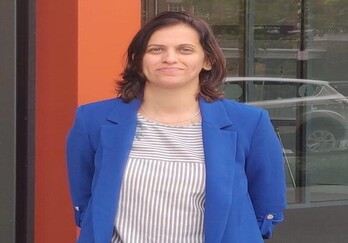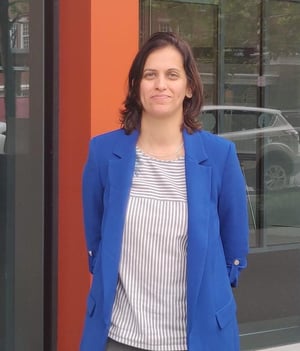Career Perspectives: Interview with Mrudula Joshi, Associate Director, Statistical Programming Services

Mrudula Joshi joined Cytel in July 2005 as a young SAS programmer. Last month, she celebrated her 15th year work anniversary at the company. In this blog we talk to Mrudula about her journey so far, her current role, and achievements; and we get some tips from her for young statisticians, programmers and those interested in pursuing a career in this field.
Cytel’s Biostatistics and Statistical Programming team for Functional Services provides integrated solutions, by blending the expertise of programming and the experience of statistics. As our FSP division continues to grow, we are looking to hire programmers and biostatisticians. Cytel's recruitment and FSP teams are hosting a one hour long Virtual Careers Open Day on Thursday, September 10th at 11:00 AM EDT. Join us to learn more about our expanding FSP team, open career opportunities and what it means to be part of Cytel. Click on the button to register for the virtual event.
 Congratulations on completing 15 years of working at Cytel. How has this journey been for you?
Congratulations on completing 15 years of working at Cytel. How has this journey been for you?
Thank you. It has been like a roller coaster ride! When I started working at Cytel, the SAS programming team in Pune (India) had only three SAS Programmers including me.
Back then, we were working with just one client and that helped me gain exposure to a wide variety of work. As the team grew and multiple projects were started, we had the scope to learn many new things. In my initial days, I did a lot of on-the-job learning and later received formal training on leadership, management and technical domain.
I believe having a technical background really helped me in all these years. It gave me the advantage of stepping in and sharing the workload of my team when there was a need. It has also helped me understand the nature of our work and support my team on the challenges faced by them. I saw growth as I transitioned from carrying out purely technical roles to managing them now.
I had the opportunity to work out of the Cytel US office for three months in 2009 and I later kept going back for client meetings whenever it was necessary.
Overall, I can say it has been a very interesting journey for me so far.
How did you identify Statistical Programming as the right career for you?
I completed my Masters in Statistics from University of Pune in India and landed my first job in Pfizer as a SAS programmer. After spending more than a year there, I got an opportunity to work with Cytel. The team was small, and they had plans of expanding it. The prospect of being involved in this project in its infancy is what excited me. An academic background in statistics worked to my advantage and I started enjoying my work. Also, SAS programming was the buzzword in the industry back then and was considered a game changer. Considering these factors, I knew I had chosen the right path.
What is your current role and with whom do you collaborate closely?
At present, I am working as an Associate Director for Statistical Programming services at Cytel. My role entails taking care of multiple engagements related to data management, statistical programming, and biostatistics. On an everyday basis, my work involves taking care of client relationships, supporting my teams for smooth operations at project level, grooming our team leads and managers, and providing technical guidance whenever required.
As I manage the commercials, contracts, metrics and resources for multiple accounts, I am required to collaborate with several departments such as, Finance, Human Resources, Recruitment, Quality Assurance, Business Development, Tech and the Management. My role also requires me to be the bridge between the management and my teams, to ensure expectations are set and met appropriately with proper flow of communication.
What excites you about working in this field?
The thing that excites me the most is the belief that we are contributing towards making a difference. For instance, we are in the middle of a pandemic and there is a confusing mix of information and hearsay in the news and on social media. It is difficult for us as the general public to know where we are headed. My work in the Life Sciences industry has given me the opportunity to be a part of some of the work that is happening related to COVID-19 studies. It is exciting to be able to contribute directly towards such projects and gain many insights. This holds true for any other drug development as well. The work makes you feel like you are making a positive contribution in extending better treatments to people.
Can you share some of your achievement with us?
I feel that finding innovative or creative ways of carrying out repetitive tasks over the years is one of the achievements. I have also created simple automations to gain efficiency for several of my own tasks and I am able to implement these in my recent projects. In one such case, I had to deal with several systems that work differently, pull reports and make sense of the data. This project was particularly interesting as it helped me understand how things work at an organizational level and how to build a systemic approach to gain efficiency at organization level processes, and what was expected of it.
What would be your top tips for early career statistical programmers looking to develop in this field?
It is very important for programmers to stay updated on news around the industry and technology. I generally see a lack of interest and ignorance in this area. Early career programmers and statisticians should have the patience to invest time in learning from a project, a technical domain or an engagement, and gain enough expertise before moving to a new project, role or company. It is also a good practice to understand the data you are working with rather than just mechanically running the programs. If you can explore data beyond just rows and columns, you will be able to gain much more understanding and insight, and you will enjoy the work.
What are the key attributes a programmer must have?
Depth of knowledge in a specific area, whether it is SAS, CDISC or therapeutic, is an essential attribute in my opinion. Second is a correct professional attitude which includes the hunger to learn, good communication skills and the ability to work effectively in a team. Last, but a basic prerequisite is to have the necessary technical knowledge and competency.
What are your main interests outside of work?
 I am quite passionate about health and fitness. Discovering and learning new fitness techniques is my hobby. I have completed a basic course in Kalaripayattu, an Indian martial art and fighting style that originated in modern-day Kerala. I also practice yoga and meditation every day. During the lockdown, I learned Zumba with the help of online videos. Even though I am not certified, I can proudly say that I can choreograph my Zumba workouts now.
I am quite passionate about health and fitness. Discovering and learning new fitness techniques is my hobby. I have completed a basic course in Kalaripayattu, an Indian martial art and fighting style that originated in modern-day Kerala. I also practice yoga and meditation every day. During the lockdown, I learned Zumba with the help of online videos. Even though I am not certified, I can proudly say that I can choreograph my Zumba workouts now.
Besides my fitness routine and everyday activities, I spend time with my son. Every day is a new learning for me as he goes about his online classes. Like everyone else, I too got to spend a lot of time around my family as we are working from home.
Thank you for taking the time to talk to us and sharing your journey.
A career at Cytel FSP provides opportunities to be involved in unrivaled biostatistics and operations research projects to improve drug development success rates, crucial for human welfare. Join us for an hour-long virtual careers open day to learn more about our expanding team, open career opportunities and what it means to be part of Cytel. Hear our story direct from Corey Dunham, Global Head, FSP, Francis Kendall, Vice President, FSP and Jayshree Garade, Associate Director, Statistical Programming. Click the button to register.


